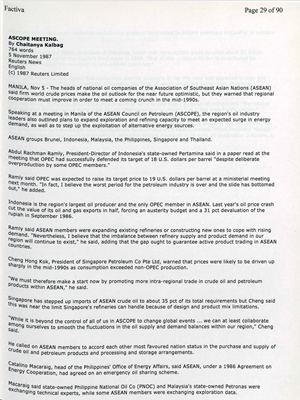ASCOPE MEETING
[Reuters]
Published date: 5th Nov 1987
5 November 1987
Reuters News
English
(c) 1987 Reuters Limited
MANILA, Nov 5 – The heads of national oil companies of the Association of Southeast Asian Nations (ASEAN) said firm world crude prices make the oil outlook for the near future optimistic, but they warned that regional cooperation must improve in order to meet a coming crunch in the mid-1990s.
Speaking at a meeting in Manila of the ASEAN Council on Petroleum (ASCOPE), the region’s oil industry leaders also outlined plans to expand exploration and refining capacity to meet an expected surge in energy demand, as well as to step up the exploitation of alternative energy sources.
ASEAN groups Brunei, Indonesia, Malaysia, the Philippines, Singapore and Thailand.
Abdul Rachman Ramly, President-Director of Indonesia’s state-owned Pertamina said in a paper read at the meeting that OPEC had successfully defended its target of 18 U.S. dollars per barrel “despite deliberate overproduction by some OPEC members.”
Ramly said OPEC was expected to raise its target price to 19 U.S. dollars per barrel at a ministerial meeting next month. “In fact, I believe the worst period for the petroleum industry is over and the slide has bottomed out,” he added.
Indonesia is the region’s largest oil producer and the only OPEC member in ASEAN. Last year’s oll price crash cut the value of its oil and gas exports in half, forcing an austerity budget and a 31 pct devaluation of the rupiah In September 1986.
Ramly said ASEAN members were expanding existing refineries or constructing new ones to cope with rising demand. “Nevertheless, I believe that the imbalance between refinery supply and product demand in our region will continue to exist,” he said, adding that the gap ought to guarantee active product trading in ASEAN countries.
Cheng Hong Kok, President of Singapore Petroleum Co Pte Ltd, warned that prices were likely to be driven up sharply in the mid-1990s as consumption exceeded non-OPEC production.
“We must therefore make a start now by promoting more intra-regional trade in crude oil and petroleum products within ASEAN,” he said.
Singapore has stepped up imports of ASEAN crude oil to about 35 pct of its total requirements but Cheng sald this was near the limit Singapore’s refineries can handle because of design and product mix limitations.
“While it is beyond the control of all of us in ASCOPE to change global events … we can at least collaborate among ourselves to smooth the fluctuations in the oil supply and demand balances within our region,” Cheng said.
He called on ASEAN members to accord each other most favoured nation status in the purchase and supply of led on ASEAN members to crude oil and petroleum products and processing and storage arrangements.
Catalino Macaraig, head of the Philippines’ Office of Energy Affairs, said ASEAN, under a 1986 Agreement on Energy Cooperation, had agreed on an emergency oil sharing scheme.
Macaraig said state-owned Philippine National Oil Co (PNOC) and Malaysia’s state-owned Petronas were exchanging technical experts, while some ASEAN members were exchanging exploration data.
He echoed Cheng’s call for a step-up in ASEAN oil trade, adding: “At present, only a small portion of the oil traded in ASEAN countries comes from ASEAN.”
Macaraig said ASEAN members could coordinate new Investments on both the upstream and downstream sides of the petroleum industry, and in planning petrochemical projects and building hydrocrackers in their refineries.
Macaraig also urged more technical consultancy projects be granted to ASEAN members Instead of to western companies.
Abdullah Mohammad Saleh, president of Petronas, noted that intra-ASEAN trade totalled about 21 billion dollars or only 16 pct of the region’s total trade in 1986. “Out of this … about 43 pct is contributed by Singapore … mainly for re-export to non-ASEAN countries.”
Saleh said Petronas had signed five production sharing contracts so far this year and expected to sign two more by year’s end. “This is in striking contrast to the total of seven which we signed over (Petronas”) 13 years.”
Unlike previous contracts, Saleh said, recent awards were largely made to Asian oil companies. “We believe that this shift to regional oil companies should strengthen our economic ties in the Asia-Pacific region.”
Pertamina’s Ramly said most of Indonesia’s production sharing contracts would expire in the mid-1990s, but the government has announced that contracts will be extended on a selective basis. PNOC President Manuel Estrella said Manila had given top priority to attractive foreign investors in its local oil exploration program. A recent survey report listed 13 potential offshore sedimentary basins.






